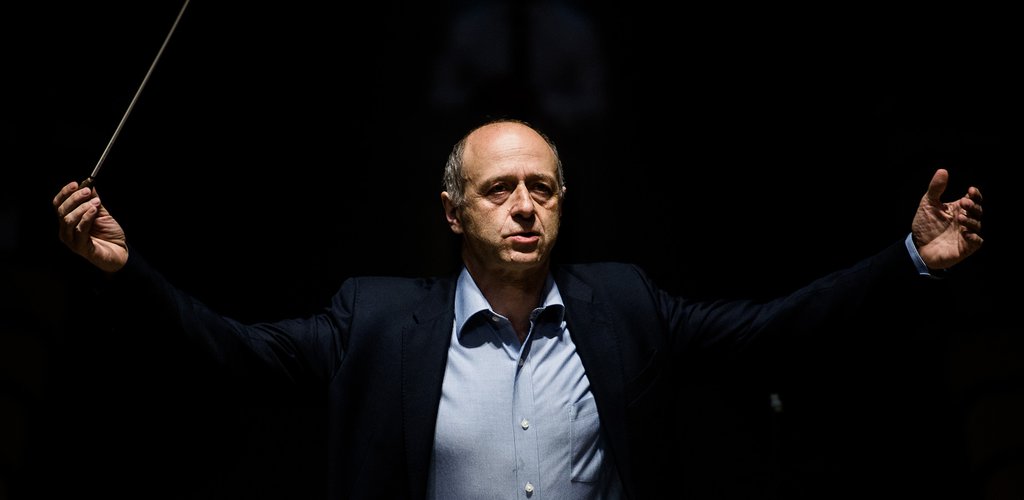Sometimes great conductors turn out to be great educators, as Iván Fischer recently proved in two triumphant evenings with the Budapest Festival Orchestra at Carnegie Hall. The menu was all-Bartók, including some of the usual concert-hall suspects, but Fischer’s vision transcended the printed program, to create an outing memorable for multiple reasons. Three blockbusters made a spine-tingling skeleton: on Friday, the suite from The Miraculous Mandarin and the Concerto for Orchestra, and on Saturday, a concert version of Bluebeard’s Castle. Interestingly, none of the instrumental concertos appeared, but the ‘filler’ that Fischer chose for the two concerts was perhaps even more notable. Critical review by Bruce Hodges, Seen and Heard International.
Fischer had engaged the Cantemus Choir to perform some of Bartók’s choral works, which are rarely heard in the United States. Though the texts use folk poetry, the music is his own, inspired by his research into Hungarian folk music. The songs give a window into another side of Bartók — specifically, his pedagogical bent — who wrote these piquant gems ‘for women’s and children’s choirs’. Directed by Dénes Szabó, the Cantemus ensemble of 43 girls hails from the Zoltán Kodály Primary School, based in based in Nyíregyháza, Hungary. Standing, scattered among the orchestra onstage, the singers first performed six of Bartók’s Twenty-Seven Two- and Three-Part Choruses (a cappella) and then a small orchestral contingent joined them for seven more.
Though the choruses are not particularly virtuosic — after all, they were designed with young singers in mind — their spiky rhythms and modal harmonies are not exactly easy, either. But the girls summoned up impressive tonal purity and intonation — all enchanting — and brought the Hungarian friend with me almost to tears. And the entire sequence, coming just before intermission, made a fine, illuminating idyll between the two blockbusters.
In pre-concert remarks, Hungarian musicologist Dr. Peter Laki of Bard College commented on the suite from The Miraculous Mandarin, written in 1918-1919, and compared its violent rhythmic charge to The Rite of Spring (1913). One might also bring Prokofiev’s 1915 Scythian Suite into the discussion, with its clattering rhythms and glass-breaking dissonances. It would be interesting to know if or when Bartók heard either. (In The Rest Is Noise, Alex Ross notes that Bartók was traveling in Algeria while The Rite was still playing in Paris.)
In any case, Fischer and his Budapest crew tore into the score with precision and glaring focus, with the conductor’s shoulders hunched over and chugging like pistons. Amid the orchestra’s torrents, the piquant tone from principal clarinetist, Ákos Ács was a delight.
The Concerto was equally impressive — an exercise in stasis versus propulsion. After affecting birdlike chirps in the opening — Fischer carefully husbanding resources — the ensemble unleashed sometimes-startling attacks, interspersed with episodes of quietude. In the second movement, the woodwind expertise was anchored by the dizzy abandon of the flutes. Throughout, Fischer made only the briefest of pauses between the movements, which not only maintained tension and momentum, but stifled audience coughing that can appear when the pauses are too long.
The mysterious middle section oozed turbulence, the fourth movement brayed like a donkey, and the boisterous finale — with Fischer both patient and relentless — transformed the orchestra into a whirring, mechanical sculpture. As a slightly anticlimactic encore, a trio from the orchestra gave an upbeat preview of the Hungarian folk music that would appear the following evening.
For the second concert, the conductor began with the Romanian Dances — again, not often heard here — led with verve and icy precision. Later came the composer’s Hungarian Peasant Songs (1933, for orchestra), delivered with similar raucous vigor.
In between came another vocal interlude — this time from one of Hungary’s most beloved singers, Márta Sebestyén, one of the founders of the folk group Muzsikás. (She has also appeared on film soundtracks such as The English Patient, Hannibal, Music Box, and Only Yesterday.) Clad in a white and dark red traditional dress, she and a trio from the orchestra — István Kádár (violin), András Szabó (viola), and Zsolt Fejérvári (bass) — mined selections from actual Hungarian peasant songs, and the set made an ideal introduction to Bartók’s orchestral version that followed. Combining her plangent tone with a few discreet dance steps, she reinforced the colors and impressions of the fertile landscape that influenced the composer.
Some conductors eschew the spoken introduction to Bluebeard’s Castle, which is a mistake, since its ominous words make an ideal preface to the morbidly fascinating events that follow. In this case, after taking the podium, Fischer turned to the audience and began Béla Balázs’s words with implacable calm. (Some reciters go more ‘Boris Karloff’ than others.) Still facing the audience, as the lower strings crept in, almost inaudibly, Fischer began stealthily conducting the ensemble behind him, eventually pivoting to face the musicians.
When bass Krisztián Cser uttered his first words as Bluebeard, his resonance all but overwhelmed the room, creating a sense of inescapable menace. Ildikó Komlósi joined soon after with her warm mezzo-soprano emphasizing her vulnerability. With each door opening, her voice became more frail (except for that high C at the fifth one), as fear began to take hold.
Fischer mined the composer’s glittering avalanche of textures with expert pacing, tempi with momentum but never too hasty, and he rarely overpowered the singers. The orchestra’s woodwinds made especially tangy contributions, amid a hailstorm of brass. As Judith opened the last door to join Bluebeard’s previous wives, the orchestra’s malevolent dissonance grew to a roar.
As a composer, Bartók ranks with the greats. But some people are not as aware of his devotion to history, education, and to inspiring musicians — and, by extension, listeners. Fischer and his Hungarian colleagues gave New York City two of the best seminars in recent memory.

